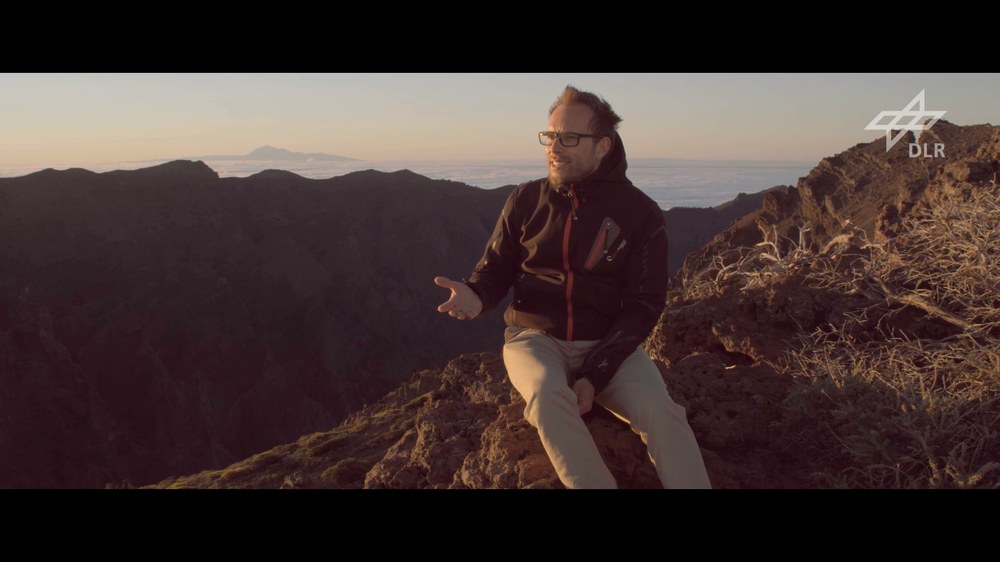"I look forward to making the world (hopefully) a little bit better every day"
FIELD OF STUDY: Mechanical engineering | NOW: Institute of Solar Research
Work with us on the challenges of our time. Towards a resource-conserving energy supply system, low-emission and future-oriented aviation, efficient transport of people and goods, and pioneering technologies for use on Earth and in space. What expertise can you contribute?
As an engineer at DLR, you will not only have access to a unique research infrastructure consisting of laboratories, simulators, test stands and other large-scale research facilities. You will also work on highly relevant topics for society. You will have enough freedom to develop your own ideas while working alongside motivated colleagues to help find solutions to the key challenges of the future.
Join us in shaping the future. Yours and that of us all.
Take Kristina Blume, for example, who completed her doctorate at the DLR Institute of Solar Research and is now a research assistant working on the mirrors (heliostats) at DLR’s solar tower power plant and on a test rig, carrying out measurements on the influence of wind. The mechanical engineer is thrilled to be able to contribute to a liveable future every day. Kristina is also impressed by DLR’s research infrastructure: “Working on a large research facility such as the solar tower is extremely exciting.”
Patrick Brunßen from the DLR Institute for Satellite Geodesy and Inertial Sensing is working on the Bose-Einstein Condensate and Cold Atom Laboratory (BECCAL) quantum experiment for the International Space Station ISS. The aim of his research? If everything works out, the results can help to show that position determination is possible with a quantum sensor and what level of accuracy can be achieved. In addition, the functionality of a quantum experiment in space is to be proven. “I can solve problems that I did not even know existed until now,” says the engineer, enthusing about the collaboration with his physicist colleagues. “I need variety. And that is exactly what I get at DLR.”
Questions that we pursue, such as:

"We really want to fly this!"
Your consent to the storage of data ('cookies') is required for the playback of this video on Quickchannel.com. You can view and change your current data storage settings at any time under privacy.
As an electrical engineer, you can take on extraordinary tasks at DLR. For example:
Take a look around – the range of our research work is wide.
Many exciting projects await you in the field of energy technology. These include, for example:
Take a look around – the range of our research work is wide.
As a vehicle engineer at DLR, you will help develop the transport systems of the future – for road, rail or water. Some possible tasks include:
Take a look around – the range of our research work is wide.
The area of human factors is becoming increasingly important and offers pioneering tasks. For example:
Take a look around – the range of our research work is wide.
As an aerospace engineer, you can take on extraordinary tasks at DLR. For example:
Take a look around – the range of our research work is wide.
Many exciting projects await you in the field of mechanical engineering. These include, for example:
Take a look around – the range of our research work is wide.
As a mechatronics engineer at DLR, you will help develop the instruments and devices we need to master the future – at the interface between electronics, computer science and mechanical engineering. Some possible tasks:
Take a look around – the range of our research work is wide.
The field of communications engineering offers pioneering tasks. For example:
Take a look around – the range of our research work is wide.
As a marine engineer, you can take on extraordinary tasks at DLR. For example:
Take a look around – the range of our research work is wide.
Many exciting projects await you in the field of environmental technology. These include, for example:
Take a look around – the range of our research work is wide.
The area of process engineering offers pioneering tasks. For example:
Take a look around – the range of our research work is wide.
As a transport scientist at DLR, you will be involved in developing the mobility of the future. Some possible tasks:
Take a look around – the range of our research work is wide.
As a materials scientist, you can take on extraordinary tasks at DLR. For example:
Take a look around – the range of our research work is wide.
Many exciting projects await you in the field of industrial engineering. These include, for example:
Take a look around – the range of our research work is wide.
We also offer pioneering tasks in other engineering sciences. For example:
Take a look around – the range of our research work is wide.
